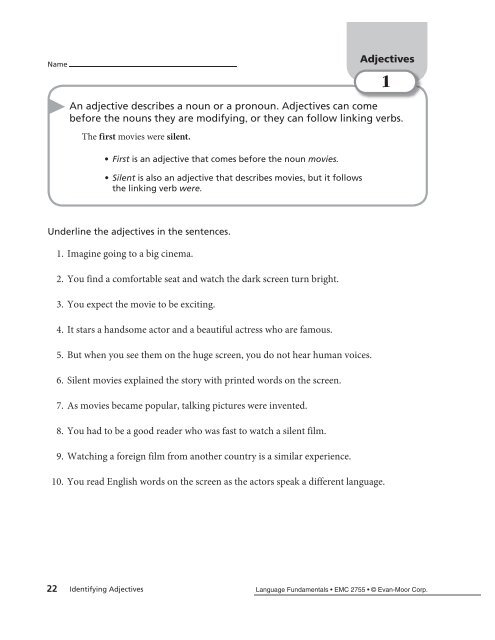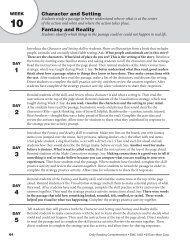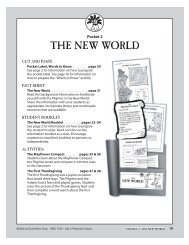Adjectives An adjective describes a noun or a pronoun. Adjectives ...
Adjectives An adjective describes a noun or a pronoun. Adjectives ...
Adjectives An adjective describes a noun or a pronoun. Adjectives ...
You also want an ePaper? Increase the reach of your titles
YUMPU automatically turns print PDFs into web optimized ePapers that Google loves.
Name<br />
<strong>Adjectives</strong><br />
1<br />
<strong>An</strong> <strong>adjective</strong> <strong>describes</strong> a <strong>noun</strong> <strong>or</strong> a pro<strong>noun</strong>. <strong>Adjectives</strong> can come<br />
bef<strong>or</strong>e the <strong>noun</strong>s they are modifying, <strong>or</strong> they can follow linking verbs.<br />
The first movies were silent.<br />
• First is an <strong>adjective</strong> that comes bef<strong>or</strong>e the <strong>noun</strong> movies.<br />
• Silent is also an <strong>adjective</strong> that <strong>describes</strong> movies, but it follows<br />
the linking verb were.<br />
Underline the <strong>adjective</strong>s in the sentences.<br />
1. Imagine going to a big cinema.<br />
2. You find a comf<strong>or</strong>table seat and watch the dark screen turn bright.<br />
3. You expect the movie to be exciting.<br />
4. It stars a handsome act<strong>or</strong> and a beautiful actress who are famous.<br />
5. But when you see them on the huge screen, you do not hear human voices.<br />
6. Silent movies explained the st<strong>or</strong>y with printed w<strong>or</strong>ds on the screen.<br />
7. As movies became popular, talking pictures were invented.<br />
8. You had to be a good reader who was fast to watch a silent film.<br />
9. Watching a f<strong>or</strong>eign film from another country is a similar experience.<br />
10. You read English w<strong>or</strong>ds on the screen as the act<strong>or</strong>s speak a different language.<br />
22 Identifying <strong>Adjectives</strong>
Name<br />
A preposition is used to show the relationship of a <strong>noun</strong><br />
<strong>or</strong> pro<strong>noun</strong> to another w<strong>or</strong>d. Prepositions can show position,<br />
direction, <strong>or</strong> other relationships.<br />
between around f<strong>or</strong> from toward<br />
across during through to inside<br />
onto over bef<strong>or</strong>e in under<br />
I see a statue on the hill.<br />
On tells where the statue is.<br />
It stands beside a plaque with inf<strong>or</strong>mation.<br />
Beside tells where the statue stands. With tells what the plaque has.<br />
The field behind the statue is where a battle took place.<br />
Behind tells where the field is.<br />
Underline the prepositions in the sentences.<br />
Prepositions<br />
1<br />
1. The Revolutionary War was fought between the American colonies and England.<br />
2. Many colonists felt that living under English rule was unfair.<br />
3. The English king across the Atlantic Ocean did not agree.<br />
4. The American colonies provided raw materials f<strong>or</strong> English fact<strong>or</strong>ies.<br />
5. The colonists bought English goods and paid taxes to the king.<br />
6. The king held onto the colonies and would not listen to their demands.<br />
7. Over time, the desire f<strong>or</strong> independence grew stronger inside the colonies.<br />
8. During the years bef<strong>or</strong>e the war, anger toward the king increased.<br />
9. All through the colonies, patriot leaders rallied people around them.<br />
10. Finally, in 1776 the colonies declared their independence from England.<br />
74 Identifying Prepositions
Name<br />
Capitalize the first w<strong>or</strong>d in a sentence.<br />
Too much junk food gave me a stomachache.<br />
If you write someone’s exact w<strong>or</strong>ds, capitalize the first w<strong>or</strong>d<br />
in the quotation.<br />
Maria said, “Drink some water, and take a rest.”<br />
If there is a break in the sentence in a quotation, do not capitalize<br />
the w<strong>or</strong>d that starts the next part of the quotation.<br />
“Yes, get some sleep,” said Mrs. Gomez, “and you will feel better in no time.”<br />
Read the sentences. Circle yes if the underlined w<strong>or</strong>d needs to be capitalized<br />
and no if it doesn’t need to be capitalized.<br />
Capitalization<br />
1<br />
1. the sleepover was planned f<strong>or</strong> Friday night. yes no<br />
2. “Let me know if you’re going,” said Bella, “because I’m not sure.” yes no<br />
3. “I’m always tired afterwards,” said Bella, “so I have to think about it.” yes no<br />
4. “so am I, but we can always catch up on sleep on Saturday night,” I said. yes no<br />
Read the st<strong>or</strong>y. Circle the w<strong>or</strong>ds that need to be capitalized.<br />
my mother is a doct<strong>or</strong>. she w<strong>or</strong>ks hard to help people stay healthy. one<br />
day, she had to take time off. we went to traffic court to challenge a parking<br />
ticket. “Dr. Franklin,” the judge said, “what is your problem with this ticket?”<br />
“well, Judge M<strong>or</strong>ita,” she answered, “I think that Officer Iyo made a<br />
mistake when he wrote the ticket.”<br />
“but it says you parked by a fire hydrant.”<br />
“yes, Judge,” my mom said, “but there is no fire hydrant at the c<strong>or</strong>ner<br />
of Smith and Elm Streets.”<br />
the judge cried, “you’re right, doct<strong>or</strong>! I’m parked there right now. Case<br />
dismissed!”<br />
Beginning of a Sentence 109
Name<br />
Statements and most commands end with a period (.).<br />
It is very imp<strong>or</strong>tant to eat a good breakfast.<br />
Please bring me some cereal.<br />
Interrogative sentences end with a question mark (?).<br />
What did you have f<strong>or</strong> breakfast?<br />
Exclamat<strong>or</strong>y sentences and strong commands end with<br />
an exclamation point (!).<br />
This oatmeal is the best I have ever tasted!<br />
Run f<strong>or</strong> your life!<br />
Write the name of the punctuation mark needed f<strong>or</strong> each sentence.<br />
1. You may have eggs <strong>or</strong> cereal f<strong>or</strong> breakfast<br />
2. Do we have any bacon<br />
3. No, but we do have sausage<br />
4. That’s my fav<strong>or</strong>ite<br />
5. Please give me two fried eggs<br />
6. Will you have eggs, Olivia<br />
7. I hate eggs<br />
8. Fix me a bowl of granola, please<br />
9. Am I late f<strong>or</strong> school<br />
10. No, sit down and eat<br />
Punctuation<br />
1<br />
End of Sentences 127
Name<br />
A contraction is a sh<strong>or</strong>tened f<strong>or</strong>m of two w<strong>or</strong>ds. A contraction<br />
uses an apostrophe in place of the missing letter <strong>or</strong> letters.<br />
have + not = haven’t<br />
they + would = they’d<br />
I + will = I’ll<br />
Match each set of w<strong>or</strong>ds with its contraction. Write the letter on the line.<br />
1. could not a. they’re<br />
2. does not b. we’ve<br />
3. he will c. he’ll<br />
4. we have d. haven’t<br />
5. they are e. doesn’t<br />
6. have not f. couldn’t<br />
In the sentences below, look f<strong>or</strong> the contractions that need apostrophes.<br />
Write the w<strong>or</strong>ds c<strong>or</strong>rectly.<br />
7. Youd be surprised by how long we have been on this bus.<br />
8. If I didnt know better, I would say that we are lost.<br />
9. We wouldnt be lost if we had paid m<strong>or</strong>e attention.<br />
10. Isnt Tanya’s house near the grocery st<strong>or</strong>e?<br />
Punctuation<br />
15<br />
144 Apostrophes in Contractions
Name<br />
Be careful not to confuse subject and object pro<strong>noun</strong>s.<br />
• Subject pro<strong>noun</strong>s should be used as the subject of a sentence <strong>or</strong> clause.<br />
I you he she it we they<br />
Inc<strong>or</strong>rect Him and me play in the <strong>or</strong>chestra<br />
C<strong>or</strong>rect He and I play in the <strong>or</strong>chestra.<br />
• Object pro<strong>noun</strong>s take the place of a w<strong>or</strong>d <strong>or</strong> group of w<strong>or</strong>ds that are<br />
the object of a verb <strong>or</strong> a preposition.<br />
Complete each sentence c<strong>or</strong>rectly.<br />
me you him her it us them<br />
Inc<strong>or</strong>rect Ms. Winters gave lessons to he and she.<br />
C<strong>or</strong>rect Ms. Winters gave lessons to him and her.<br />
1. The students auditioned f<strong>or</strong> .<br />
2. Ms. Winters asked to hear .<br />
3. She gave and me some sheet music to read.<br />
4. Conn<strong>or</strong> and played a duet.<br />
5. sounded good together.<br />
C<strong>or</strong>rect the pro<strong>noun</strong> err<strong>or</strong>s in this paragraph.<br />
Evan and me play guitar together. We practice every Saturday. My<br />
Usage<br />
1<br />
mother taught he and I to play. Sometimes her watches us practice and gives<br />
us advice. It helps Evan and I. My little sister and me sit down with the guitar<br />
sometimes. Tom<strong>or</strong>row she’s going to play f<strong>or</strong> Mom and I.<br />
Subject <strong>or</strong> Object Pro<strong>noun</strong>s 149
Name<br />
<strong>An</strong>tonyms are w<strong>or</strong>ds that have opposite meanings.<br />
slowly—quickly, rapidly, hurriedly, speedily, swiftly<br />
whisper—scream, yell, holler, shout, screech<br />
kind—nasty, mean, awful, cruel, miserly<br />
sad—happy, thrilled, delighted, beaming, joyous<br />
Write an antonym f<strong>or</strong> each w<strong>or</strong>d.<br />
1. gloomy<br />
2. energetic<br />
3. cowardly<br />
4. wisely<br />
5. difficult<br />
6. insulted<br />
7. polite<br />
8. feast<br />
Write a sentence f<strong>or</strong> each antonym. Tell about movies <strong>or</strong> TV shows<br />
you’ve watched recently. Be sure to underline titles.<br />
Vocabulary<br />
11<br />
9. (exciting) ______________________________________________________________<br />
______________________________________________________________________<br />
10. (b<strong>or</strong>ing) _______________________________________________________________<br />
______________________________________________________________________<br />
<strong>An</strong>tonyms 169
Name<br />
Vocabulary<br />
20<br />
Often you can tell a w<strong>or</strong>d’s meaning by looking at the other w<strong>or</strong>ds<br />
and groups of w<strong>or</strong>ds around it.<br />
The solution was obvious. Everyone saw it.<br />
Obvious means “everyone can see it.”<br />
Read each sentence. Then write what the underlined w<strong>or</strong>d means.<br />
1. Frankie had never been so distracted. She couldn’t keep her mind on her w<strong>or</strong>k.<br />
The w<strong>or</strong>d distracted means .<br />
2. The routine she had repeated over and over was slipping away.<br />
The w<strong>or</strong>d routine means .<br />
3. She had practiced her scales diligently, never f<strong>or</strong>getting to do them.<br />
The w<strong>or</strong>d diligently means .<br />
4. With trepidation, Frankie sat down to play, fearful that people wouldn’t like her playing.<br />
The w<strong>or</strong>d trepidation means .<br />
5. The audience applauded Frankie enthusiastically after she played, cheering her on.<br />
The w<strong>or</strong>d enthusiastically means .<br />
6. The concert increased Frankie’s determination to continue her playing. Nothing was<br />
going to stop her.<br />
The w<strong>or</strong>d determination means .<br />
180 W<strong>or</strong>d Meaning (context)





